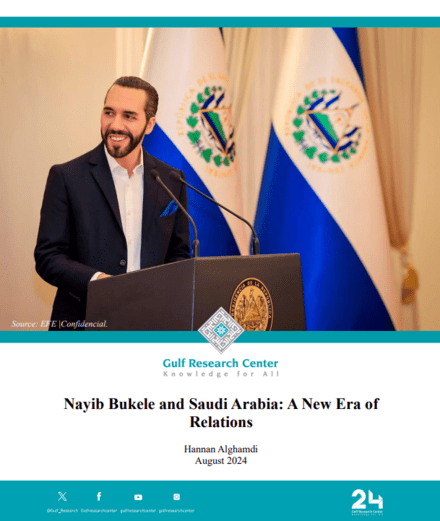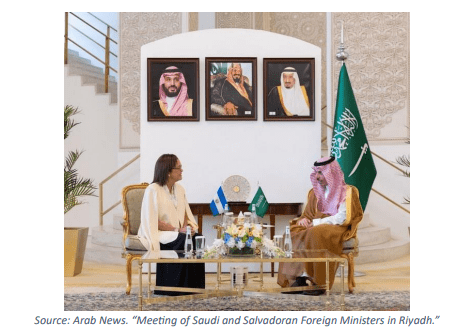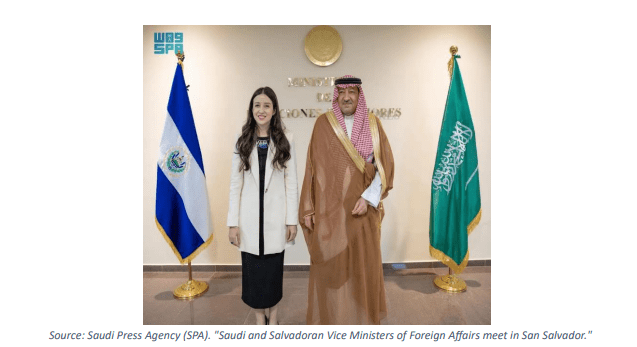Select any text and click on the icon to listen! ByGSpeech
ByGSpeech
 ByGSpeech
ByGSpeech ByGSpeech
ByGSpeech
Since taking office in 2019, Nayib Bukele, the President of El Salvador, has undertaken a number of bold reforms aimed at re-positioning the country in the region and beyond. His approach to governance and foreign policy has been as dynamic as it has been ambitious, and this has become more evident in his efforts to deepen ties with Saudi Arabia and the Gulf Cooperation Council (GCC) states. At the same time, Bukele's leadership is a study in contrasts. On the one hand, he is a reformer, committed to transforming El Salvador and making it a safer, more prosperous place for its people. On the other, he is a strategist, keenly aware of the importance of positioning El Salvador within the global landscape.
One example of this is President Bukele's "Territorial Control Plan," which has been crucial in reducing gang violence—a long-standing issue in El Salvador. Under Bukele, crime rates have dropped sharply, fostering a more stable environment for investment and development. Salvadoran government data from 2023 show that homicides have significantly decreased since the plan's launch in June 2019, with the rate falling from 35.8 to 2.2 per 100,000 inhabitants as of July 2023. Despite criticism that his approach lacks due process leading to the arrest of thousands of innocent people, discussions on whether this approach could serve as a model for other Latin American countries grappling with similar issues is ongoing.
On the economic front, Bukele decided in 2021 to make Bitcoin a legal tender, making El Salvador the first country in the world to officially recognize the cryptocurrency. Given the inherent volatility of digital currencies, the move has been met with skepticism, particularly as most Salvadorans have largely ignored Bitcoin so far. A 2023 survey by the University of Central America found that 88% of Salvadorans did not use Bitcoin. According to Reuters, many locals expressed little interest in understanding Bitcoin, focusing instead on more pressing concerns like job availability and the rising costs of housing and food. Bukele, meanwhile, remains optimistic that with time, Bitcoin will play a significant role in El Salvador’s economic future. Paired with the improvement in security, this initiative has already begun rebranding the country, contributing to a 157% increase in tourism in the first half of 2024 compared to the same period in 2019.
Bukele’s ambitions also extend far beyond El Salvador’s borders. His foreign policy can be characterized as forward-thinking, with a determination to diversify partnerships including with Saudi Arabia and the GCC states. This can be seen as a deliberate move to align El Salvador with nations that share Bukele’s vision of innovation and development. One of the clearest signs of the growing relationship between El Salvador and Saudi Arabia is the inauguration of El Salvador's first embassy in Riyadh on May 2, 2024. This historic event marks a milestone in the diplomatic ties between the two nations.
Ahead of the inauguration, HRH Prince Faisal bin Farhan met with El Salvador's Minister of Foreign Affairs to discuss key issues within the framework of their bilateral strategic relations. HE Alexandra Hill Tinoco emphasized the importance of this partnership, stating, "Saudi Arabia is an important partner for our nation, and we are extremely grateful for their support of initiatives driven by President Nayib Bukele, who has dedicated all efforts and resources of his administration to the development and well-being of Salvadorans."

Further solidifying this partnership, the CEO of the Saudi Fund for Development, HE Sultan bin Abdulrahman Al-Marshad, signed an agreement with HE Alexandra Hill Tinoco, on May 3, 2024, aimed at enhancing developmental cooperation. This agreement, signed in Riyadh, paves the way for a significant project involving biogas power generation and wastewater treatment in the Acelhuate River area, funded by a development loan from the Saudi fund. Foreign Minister Hill emphasized that this support is crucial for El Salvador, as it will ensure the production of clean and renewable energy for thousands of Salvadoran households. In this context, HRH Prince Faisal highlighted “Saudi Arabia's commitment to initiatives that enhance the country’s technological and digital capabilities, including the development of artificial intelligence, which aligns with El Salvador's vision for digital progress.” He expressed pride in supporting projects that will have a direct impact on the health and quality of life of Salvadorans.
Trade data supports the growing relationship between Saudi Arabia and El Salvador. According to the Observatory of Economic Complexity (OEC), Saudi Arabia's exports to El Salvador amounted to $24.5 million in 2022, with propylene polymers, ethylene polymers, and raw aluminum being the most significant products. Over the last five years, these exports have increased significantly, with an annual growth rate of 20.3%, from $9.74 million in 2017 to $24.5 million in 2022. El Salvador's exports to Saudi Arabia also show a strong upward trend. In 2017, El Salvador exported $5.81 million to Saudi Arabia, with coffee, trunks and cases, and paper containers being the top exports. The value of these exports has increased at an impressive annual rate of 31.3% over the last five years, from $1.49 million in 2017 to $5.81 million in 2022.
On June 4, 2024, Saudi Arabia’s Vice Minister of Foreign Affairs, Eng. Waleed bin Abdulkarim El-Khereiji, met with El Salvador’s Vice Minister of Foreign Affairs, Adriana Mira de Pereira, in San Salvador. The meeting focused on reviewing bilateral relations and exploring opportunities for cooperation across various fields. The discussions featured the growing bond between the two countries, with both sides expressing a strong interest in deepening their strategic relationship. This meeting, occurring a month after the inauguration of El Salvador's first embassy in Riyadh, further highlights the ongoing efforts to strengthen ties between the two nations.

By aligning with Saudi Arabia and the GCC, President Bukele is opening the door for El Salvador to new markets, investment opportunities, and technological partnerships. These relationships are not just about economics; they are about securing El Salvador’s place in a more diversified global order. For El Salvador, it is a strategic play to ensure that his country remains relevant in an increasingly interconnected world. For Saudi Arabia, gaining the support of countries like El Salvador bolsters its bid for Expo 2030 and strengthens its leadership role in global initiatives focused on innovation and sustainability. In the end, it could develop to be a win-win situation for both countries.
*Hannan Alghamdi is a Researcher at the Gulf Research Center (GRC)